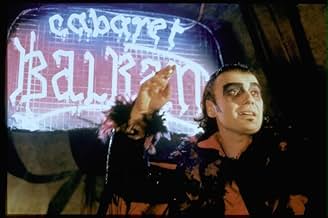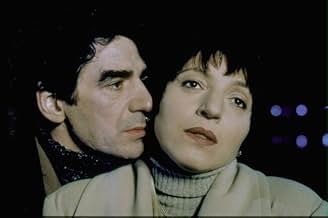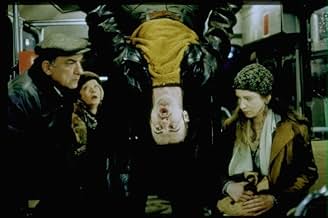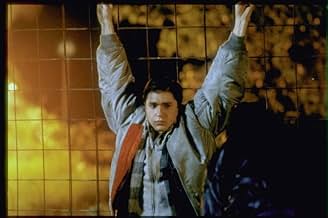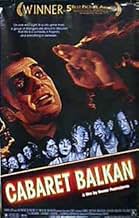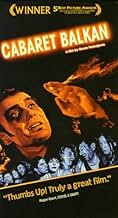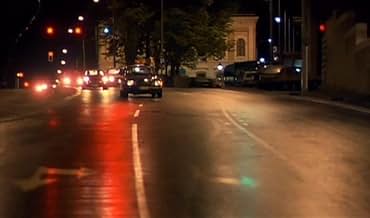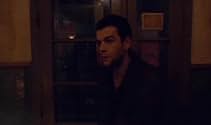NOTE IMDb
7,7/10
5,9 k
MA NOTE
Ajouter une intrigue dans votre langueRandom Belgrade citizens interact with each other in a night full of crime, frustration, betrayal and revenge.Random Belgrade citizens interact with each other in a night full of crime, frustration, betrayal and revenge.Random Belgrade citizens interact with each other in a night full of crime, frustration, betrayal and revenge.
- Réalisation
- Scénario
- Casting principal
- Récompenses
- 8 victoires et 4 nominations au total
Vojislav 'Voja' Brajovic
- Topi
- (as Vojislav Brajovic)
Predrag 'Miki' Manojlovic
- Mane
- (as Predrag-Miki Manojlovic)
Avis à la une
In one night the 1990s, in Beograd, many violent acts happen almost simultaneously, having as a `touching point' linking all of them the presence of a cab driver. A car crash, a vengeance against a former policeman, a harsh dialog between two boxers friends, a paranoid man in a bus, the anger of a lover against the former passion of his mate, the jealousy of a boy friend, all of these feelings are the motive for an outburst of violence from locals. The Brazilian title (`Powder Keg') metaphorically defines the state-of-mind of the civilian population, ready to explode in a city without law in times of war. I liked the screenplay, the direction and performance of the cast of this low budget movie. However, living in Rio de Janeiro, this black humor theme does not surprise me. My vote is eight.
Title (Brazil): `Barril de Pólvora' (`Powder Keg')
Title (Brazil): `Barril de Pólvora' (`Powder Keg')
10Zambelli
If you know at least something about the events that took place in former Yugoslavia during the 1990s, you should be able to understand this movie.
Many people have misinterpreted this movie as a vicious depictment of some sick Serbian mentality or an exaggerated vision of a post-war Serbia. None of this is true. The theme of "Cabaret Balkan" is not violence. A great parallel can be made between "Cabaret Balkan" and "A Clockwork Orange". The violence in both movies is not the theme - it's merely an extreme way of proving an important point.
The oppressors and the oppressed. The small fish and the big fish. The dogs and the sheep (rock fans might find interesting similarities between this movie and Pink Floyd's "Animals"). There seems to be certain hierarchy present in "Cabaret Balkan". The passive majority is constantly oppressed by the violent minority, many of whom themselves are victims of "bigger fish". The passive majority is always ready to turn a blind eye, to look the other way or, as a scene from the movie so visually illustrates, sit on a different side of the bus.
Who should the war be blamed on? Is it the government's fault? Or is the fault of the people who elected the government? Should the criminals in power take the blame or the people who let them stay in power? A key scene of the movie which takes place in the bus seems to tell us the most about this issue. "You finally stood up to me", says the young bully to the old man who refuses to play along and answer his insulting questions. In a way, the young bully on the bus is the only real hero of "Cabaret Balkan". He is the only one with the guts to stand up for his rights - everyone else would much rather look the other way, ignore the situation and mind their own business.
The original title of the movie - "Powder Keg", draws its name from an old nickname the Balkan peninsula earned at the beginning of this century - a powder keg ready to explode, with multitudes of people constantly fighting wars, making up, then fighting again. After all, isn't that what all the characters in the movie do? The strange mentality of the Balkan people cannot be easily explained, so director Paskaljevic takes it into extremes and creates extremely surreal scenes, like the one in the boxing ring and the bar. Fight. Drink. Fight. Drink. War. Peace. War. Peace. What's it going to be? Doesn't matter, as long as we're all in "good health".
Many people have misinterpreted this movie as a vicious depictment of some sick Serbian mentality or an exaggerated vision of a post-war Serbia. None of this is true. The theme of "Cabaret Balkan" is not violence. A great parallel can be made between "Cabaret Balkan" and "A Clockwork Orange". The violence in both movies is not the theme - it's merely an extreme way of proving an important point.
The oppressors and the oppressed. The small fish and the big fish. The dogs and the sheep (rock fans might find interesting similarities between this movie and Pink Floyd's "Animals"). There seems to be certain hierarchy present in "Cabaret Balkan". The passive majority is constantly oppressed by the violent minority, many of whom themselves are victims of "bigger fish". The passive majority is always ready to turn a blind eye, to look the other way or, as a scene from the movie so visually illustrates, sit on a different side of the bus.
Who should the war be blamed on? Is it the government's fault? Or is the fault of the people who elected the government? Should the criminals in power take the blame or the people who let them stay in power? A key scene of the movie which takes place in the bus seems to tell us the most about this issue. "You finally stood up to me", says the young bully to the old man who refuses to play along and answer his insulting questions. In a way, the young bully on the bus is the only real hero of "Cabaret Balkan". He is the only one with the guts to stand up for his rights - everyone else would much rather look the other way, ignore the situation and mind their own business.
The original title of the movie - "Powder Keg", draws its name from an old nickname the Balkan peninsula earned at the beginning of this century - a powder keg ready to explode, with multitudes of people constantly fighting wars, making up, then fighting again. After all, isn't that what all the characters in the movie do? The strange mentality of the Balkan people cannot be easily explained, so director Paskaljevic takes it into extremes and creates extremely surreal scenes, like the one in the boxing ring and the bar. Fight. Drink. Fight. Drink. War. Peace. War. Peace. What's it going to be? Doesn't matter, as long as we're all in "good health".
10ereinion
Goran Paskaljevic outdoes himself with this dark, satiric drama-comedy. What he gives us here is Serbia in a nutshell, a post-war Serbia torn with crime, anger and mistrust. "Who's to blame?" is the central question here and the line is spoken several times throughout the movie, once in a particularly hilarious scene. The bus scene is the one that illustrates the situation Serbia and most of former Yugoslavia are in-chaos. There is no one behind the wheel, so everybody is trying to take control.
There is no way to write about this film without saying something about the cast. It consists of all the finest Serbian and Yugoslav actors (two of them, Trifunovic and Glogovac, are from Herzegovina originally and two are from Macedonia) and it is one of the cases where the entire cast is the protagonist. Particularly fine performances come from Miki Manojlovic, Mirjana Jokovic, Mirjana Karanovic, Voja Brajovic, Aleksandar Bercek, Nebojsa Glogovac and Lazar Ristovski. The storyline is incredibly well built and all stories and characters are equally good.
This is a flawless, high quality tragicomedy which will provide you great entertainment and watching experience, as well as a good insight into the situation of this country. It is a humanistic and poignant film with a message, a cry for help. Balkan-a barrell of gunpowder, a-hole of the world.
There is no way to write about this film without saying something about the cast. It consists of all the finest Serbian and Yugoslav actors (two of them, Trifunovic and Glogovac, are from Herzegovina originally and two are from Macedonia) and it is one of the cases where the entire cast is the protagonist. Particularly fine performances come from Miki Manojlovic, Mirjana Jokovic, Mirjana Karanovic, Voja Brajovic, Aleksandar Bercek, Nebojsa Glogovac and Lazar Ristovski. The storyline is incredibly well built and all stories and characters are equally good.
This is a flawless, high quality tragicomedy which will provide you great entertainment and watching experience, as well as a good insight into the situation of this country. It is a humanistic and poignant film with a message, a cry for help. Balkan-a barrell of gunpowder, a-hole of the world.
This movie impressed me a lot, however the fine details and message of this movie might very easily escape the unwary viewer. I was lucky to watch the movie with a friend from Ex-Yugoslavia who could point out what exactly lied behind every small gesture or circumstantial hints hidden in a single sentence.
The characters in this movie are in a constant dilemma, half self-inflicted, half caused by higher powers. Yugoslavia at that time is isolated - mentally, economically, morally. There is no valve to let of the steam, so the people take on themselves, murdering, plundering, threatening and raping. Almost every character is shown to be not fully guilty, but nevertheless brought down by their own acts of violence. The bus scene especially shows that the Yugoslavian people have forgotten to take their fate in their own hands. A young men is fed up with the system, his wasted life and the apathy of his people in general. The best scene in the movie for me
Tragic-comically ends this scene like the whole movie. The whole plot takes place one day before the Dayton agreement, another twist of fate, that just on this day those people lose their lives for nothing and absolutely nothing.
When you watch this movie you have to realize the deeper message has been made for the Yugoslavian audience to show them the mechanizations of their lives and their own guilt going with it. He tries to hammer this in the minds of the viewers hence the compressed plot and intermingling of scenes. A masterpiece.
The characters in this movie are in a constant dilemma, half self-inflicted, half caused by higher powers. Yugoslavia at that time is isolated - mentally, economically, morally. There is no valve to let of the steam, so the people take on themselves, murdering, plundering, threatening and raping. Almost every character is shown to be not fully guilty, but nevertheless brought down by their own acts of violence. The bus scene especially shows that the Yugoslavian people have forgotten to take their fate in their own hands. A young men is fed up with the system, his wasted life and the apathy of his people in general. The best scene in the movie for me
Tragic-comically ends this scene like the whole movie. The whole plot takes place one day before the Dayton agreement, another twist of fate, that just on this day those people lose their lives for nothing and absolutely nothing.
When you watch this movie you have to realize the deeper message has been made for the Yugoslavian audience to show them the mechanizations of their lives and their own guilt going with it. He tries to hammer this in the minds of the viewers hence the compressed plot and intermingling of scenes. A masterpiece.
As truth can be defined by the observer, it is also guided by the artist. This film is as close to truth in film as one can get. The state of the Balkans is one which cannot be easily defined, but understood, if you understand its peoples. The truth of this film lies in the reactionary maelstrom that has been the Balkans for a very, very long time. The film ties the lives together of many, equally bizarre characters and events which are tied together artistically by a collage of madness and life on the edge of it. Please do not miss this film, and watch it several times if possible.
Le saviez-vous
- AnecdotesFilmed entirely at night.
- Bandes originalesFanfare / Duvacki
Orkestar 'Oluja' Sinisa Stankovica
Meilleurs choix
Connectez-vous pour évaluer et suivre la liste de favoris afin de recevoir des recommandations personnalisées
- How long is Cabaret Balkan?Alimenté par Alexa
Détails
- Date de sortie
- Pays d’origine
- Site officiel
- Langue
- Aussi connu sous le nom de
- Cabaret Balkan
- Lieux de tournage
- Sociétés de production
- Voir plus de crédits d'entreprise sur IMDbPro
Box-office
- Montant brut aux États-Unis et au Canada
- 108 103 $US
- Week-end de sortie aux États-Unis et au Canada
- 11 774 $US
- 25 juil. 1999
- Durée
- 1h 42min(102 min)
- Couleur
- Mixage
- Rapport de forme
- 1.85 : 1
Contribuer à cette page
Suggérer une modification ou ajouter du contenu manquant

